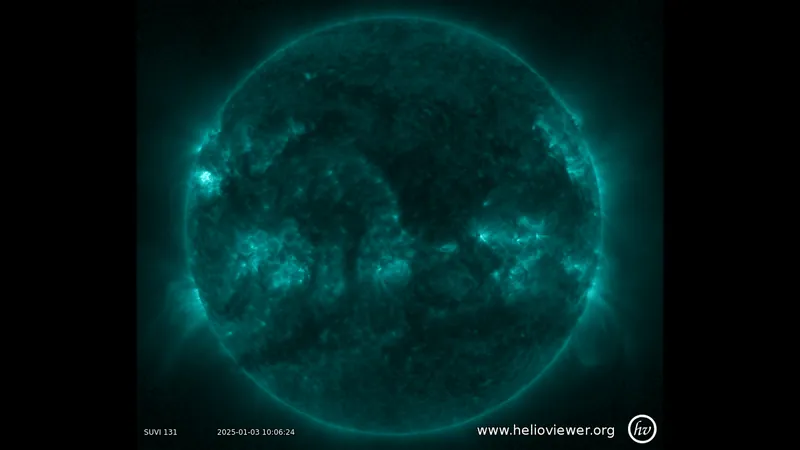
Sun Blasts into 2025 with Intense X1.2 Solar Flare, Triggers Widespread Radio Blackouts!
2025-01-03
Author: Li
Introduction
The year 2025 kicked off spectacularly as our sun unleashed a powerful X1.2 solar flare early this morning, captivating scientists and astronomers alike. Peaking at 6:40 a.m. EST (1140 GMT) on January 3, this astronomical phenomenon emanated from an active sunspot region identified as AR 3947.
Impact on Communication
As a result of this powerful solar flare, significant radio blackouts occurred across parts of the Southern Atlantic, Africa, and eastern South America. High-frequency (HF) radio communications were severely compromised during this event, with many regions experiencing total or partial signal loss while exposed to sunlight.
Classification of Solar Flares
Solar flares are classified using a scale comprising four categories, where each ascending class represents an increase in potency tenfold compared to the class below it. X-class flares, which include the current X1.2 event, are the most potent, followed by M-class, C-class, and the weakest, B-class. These classifications help scientists gauge potential impacts on Earth’s technological systems and communications.
NOAA's Rating and Analysis
The National Oceanic and Atmospheric Administration (NOAA)’s Space Weather Prediction Center (SWPC) categorized this event as an R3 blackout on its Space Weather Scale, which evaluates the potential severity of radio disruptions caused by solar activity. An R3 rating denotes a 'Strong' blackout, just below the 'Severe' (R4) and 'Extreme' (R5) categories.
No CMEs Detected
Notably, SWPC scientists confirmed that no coronal mass ejections (CMEs) were detected following the solar flare. CMEs, which are notable bursts of solar wind and magnetic fields rising above the solar corona or being released into space, can lead to geomagnetic storms on Earth. These storms have the potential to disrupt power grids, affect satellite operations, and even create dazzling auroras visible at lower latitudes.
Looking Ahead
As we move further into the weekend, scientists are keeping a close watch on the sun's activity. Forecasts suggest the possibility of additional minor to moderate radio blackouts due to ongoing activity from the sunspot regions.
Conclusion
Stay tuned as more exciting solar events are likely to unfold; the sun is undoubtedly providing an electrifying start to the new year! Make sure to follow for the latest updates on this and similar cosmic phenomena!
 Brasil (PT)
Brasil (PT)
 Canada (EN)
Canada (EN)
 Chile (ES)
Chile (ES)
 Česko (CS)
Česko (CS)
 대한민국 (KO)
대한민국 (KO)
 España (ES)
España (ES)
 France (FR)
France (FR)
 Hong Kong (EN)
Hong Kong (EN)
 Italia (IT)
Italia (IT)
 日本 (JA)
日本 (JA)
 Magyarország (HU)
Magyarország (HU)
 Norge (NO)
Norge (NO)
 Polska (PL)
Polska (PL)
 Schweiz (DE)
Schweiz (DE)
 Singapore (EN)
Singapore (EN)
 Sverige (SV)
Sverige (SV)
 Suomi (FI)
Suomi (FI)
 Türkiye (TR)
Türkiye (TR)
 الإمارات العربية المتحدة (AR)
الإمارات العربية المتحدة (AR)